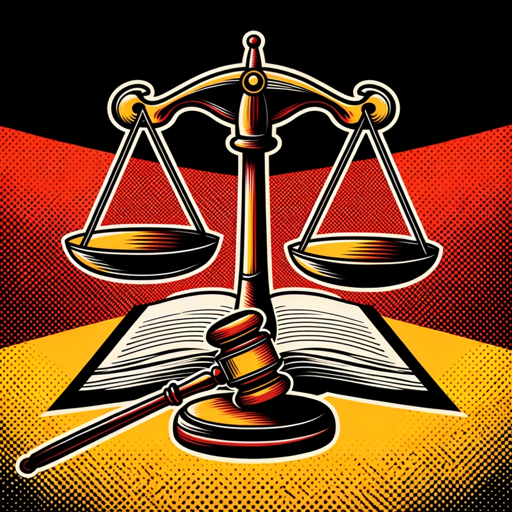Dutch Law-Dutch legal information
AI-powered Dutch legal guidance
Can you provide the law and case law on Dutch traffic regulations?
Detail Dutch employment law with a link to the statute and relevant cases.
Explain the Dutch laws on digital privacy with case references and links.
What are the latest changes in Dutch environmental law with case law links?
Related Tools
Load More
Nederlandse Taal- en Grammatica-expert
Expert in Nederlandse taal, grammatica en spelling

German Law Buddy
Rechtliche Unterstützung zu BGB, StGB, SGB und StVO.

Suomen Laki
A Finnish Law GPT, providing legal information from www.finlex.fi. No legal advice, verify with an expert.

AvvocatoGPT - Diritto Italiano & Legge
Esperto in diritto civile italiano, risposte precise e concise.

Nederlandse spelling / copywriter (BE)
Plak je tekst, druk op enter en krijg meteen een minimaal herwerkte tekst plus spellcheck, trouw aan de originele vibe en schrijfstijl en toont je aanpassingen. Is effectiever bij korte tekstblokken.

My Belgian Lawyer
Conseiller juridique polyglotte en droit belge
20.0 / 5 (200 votes)
Introduction to Dutch Law
Dutch Law encompasses the legal framework governing the Netherlands, grounded in a civil law system influenced by Roman and French law. The primary sources of Dutch law include the Constitution (Grondwet), statutory laws, case law, and customary law. The legal system is structured into various branches, such as constitutional law, administrative law, civil law, criminal law, and international law. Each branch has specific statutes and regulations governing different aspects of society. For instance, the Dutch Civil Code (Burgerlijk Wetboek) covers civil matters such as contracts, property, and family law, while the Penal Code (Wetboek van Strafrecht) addresses criminal offenses and penalties. An example scenario illustrating the application of Dutch law is a contract dispute between two businesses. The case would be adjudicated based on the relevant provisions of the Dutch Civil Code, with reference to case law from uitspraken.rechtspraak.nl providing precedents.

Main Functions of Dutch Law
Providing Legal Statutes
Example
When a user queries the legal requirements for forming a contract in the Netherlands, Dutch Law provides the specific articles from the Dutch Civil Code outlining the conditions and obligations.
Scenario
A small business owner wants to ensure that their new employment contracts comply with Dutch law. They can reference the specific articles in the Civil Code that pertain to employment contracts.
Case Law References
Example
If a user needs information on how Dutch courts have ruled on a particular legal issue, Dutch Law can reference relevant case law, such as a landmark decision by the Hoge Raad (Supreme Court).
Scenario
A lawyer preparing for a case on intellectual property infringement can look up previous court rulings to build their legal argument.
Legal Guidance and Interpretation
Example
When interpreting complex legal provisions, Dutch Law provides clear explanations and practical guidance, drawing from authoritative legal sources.
Scenario
An expatriate seeking to understand their rights under Dutch immigration law can receive detailed explanations of relevant statutes and regulations, helping them navigate the legal process.
Ideal Users of Dutch Law Services
Legal Professionals
Lawyers, judges, and legal scholars who require precise and authoritative legal information. They benefit from quick access to statutes, case law, and legal interpretations to support their work in litigation, legal research, and policy development.
Businesses and Entrepreneurs
Companies and business owners who need to ensure compliance with Dutch regulations. They benefit from guidance on commercial law, employment law, and regulatory requirements, helping them navigate the legal landscape effectively.
General Public
Individuals seeking to understand their legal rights and obligations. They benefit from accessible legal information on topics such as family law, consumer rights, and immigration, empowering them to make informed decisions.

How to Use Dutch Law
Step 1
Visit aichatonline.org for a free trial without login, also no need for ChatGPT Plus.
Step 2
Ensure you have a stable internet connection and a modern web browser for the best user experience.
Step 3
Familiarize yourself with the main sources: wetten.overheid.nl for legal statutes, uitspraken.rechtspraak.nl and uitspraken.rechtbank.nl for case law.
Step 4
Use the search functionality to find specific laws or cases by entering keywords or article numbers.
Step 5
For comprehensive legal guidance, input your detailed query and review the provided links to relevant laws and case law.
Try other advanced and practical GPTs
US Law
AI-powered legal research assistance

🍮🍬Sweet-GPT🍭🍯
Magical AI that enhances creativity.

한글에 최적화된 글쓰기 전문가
AI-Powered Korean Writing Optimization

Band Logo Buddy
AI-powered designs for your band

Java Mentor
AI-powered assistant for mastering Java

Football Tip Master
AI-powered football betting insights

Texas Law
Your AI-Powered Texas Law Guide

Premise Analyzer
AI-Powered Text Analysis and Insights

Ordinary Differential Equations II Tutor
AI-powered insights for mastering complex ODEs.

Effective, Gentle, and Optimization-Focused
AI-Powered Solutions for Complex Queries

Screenplay Coverage
AI-powered Screenplay Analysis

CineFlow Script Coverage
AI-powered insights for screenplays.

- Academic Writing
- Legal Research
- Case Analysis
- Compliance Check
- Statutory Review
Dutch Law Q&A
What sources of legal information does Dutch Law utilize?
Dutch Law uses wetten.overheid.nl for legal statutes and uitspraken.rechtspraak.nl and uitspraken.rechtbank.nl for case law.
How can Dutch Law assist with understanding Dutch legal statutes?
Dutch Law provides detailed information on Dutch legal statutes, including titles and direct links to relevant laws on wetten.overheid.nl, ensuring easy access to accurate legal texts.
Can Dutch Law provide case law references?
Yes, Dutch Law references case law from uitspraken.rechtspraak.nl and uitspraken.rechtbank.nl, allowing users to review relevant judicial decisions.
Is Dutch Law suitable for academic research?
Absolutely, Dutch Law is ideal for academic research as it offers comprehensive legal information and direct access to statutory texts and case law.
How can I ask Dutch Law specific legal questions?
Simply input your detailed legal question, and Dutch Law will provide relevant statutes and case law references along with direct links for further reading.